Unit 1 Life Choices Writing Workshop课件(共32张))-高中英语北师大版(2019)必修第一册(共33页)
文档属性
| 名称 | Unit 1 Life Choices Writing Workshop课件(共32张))-高中英语北师大版(2019)必修第一册(共33页) | 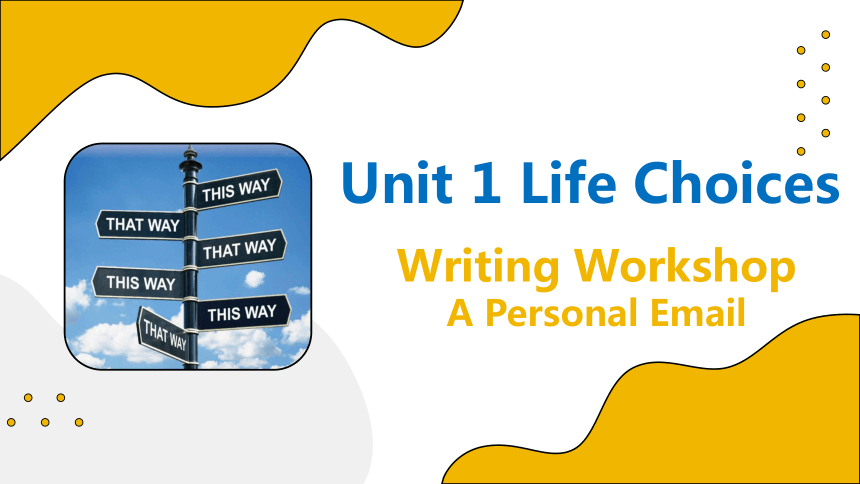 | |
| 格式 | pptx | ||
| 文件大小 | 28.2MB | ||
| 资源类型 | 教案 | ||
| 版本资源 | 北师大版(2019) | ||
| 科目 | 英语 | ||
| 更新时间 | 2025-05-29 17:02:55 | ||
图片预览


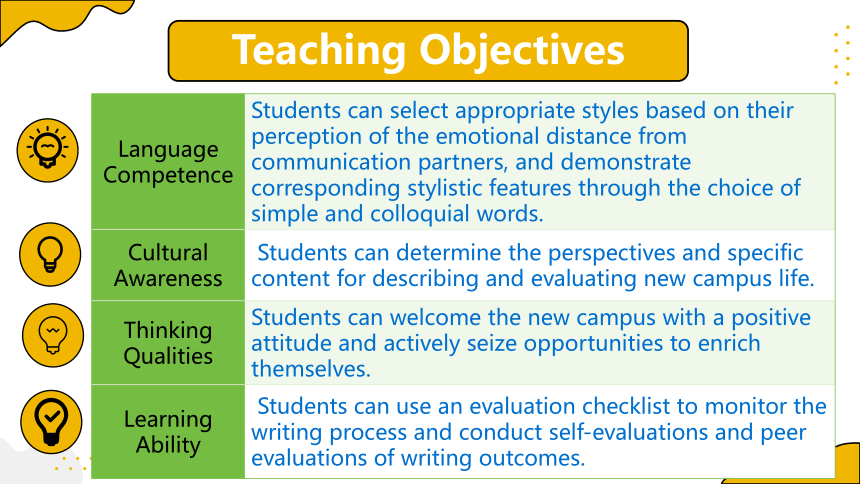
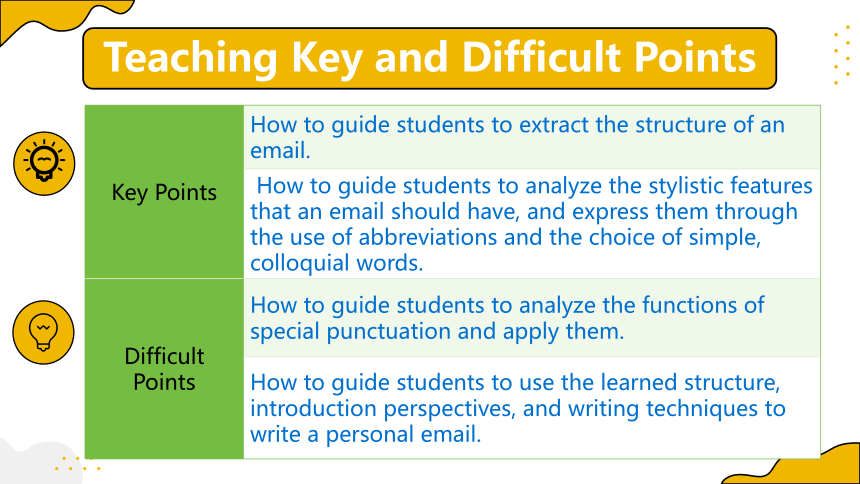



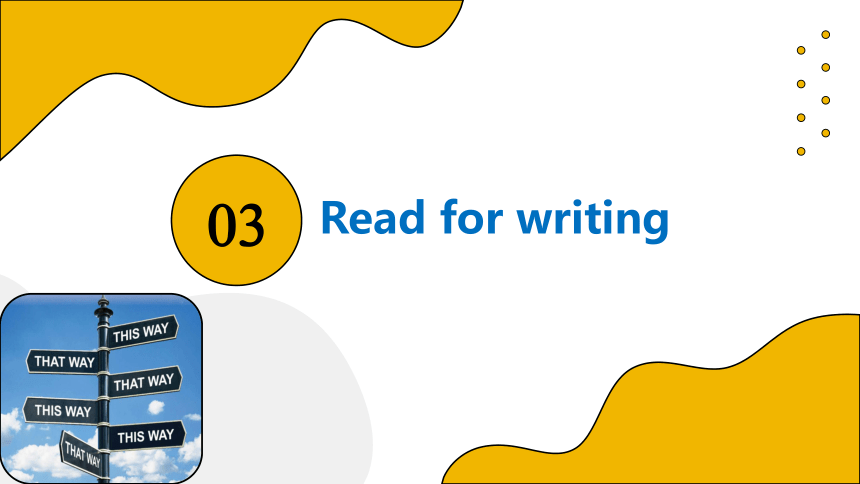
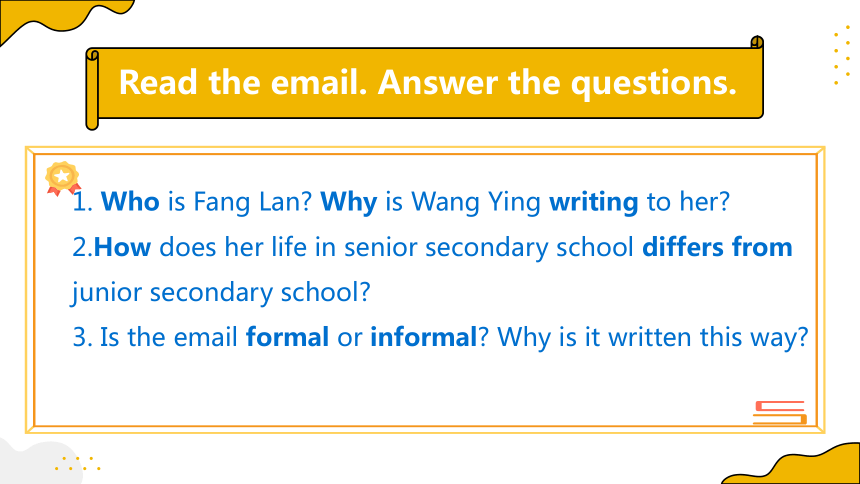
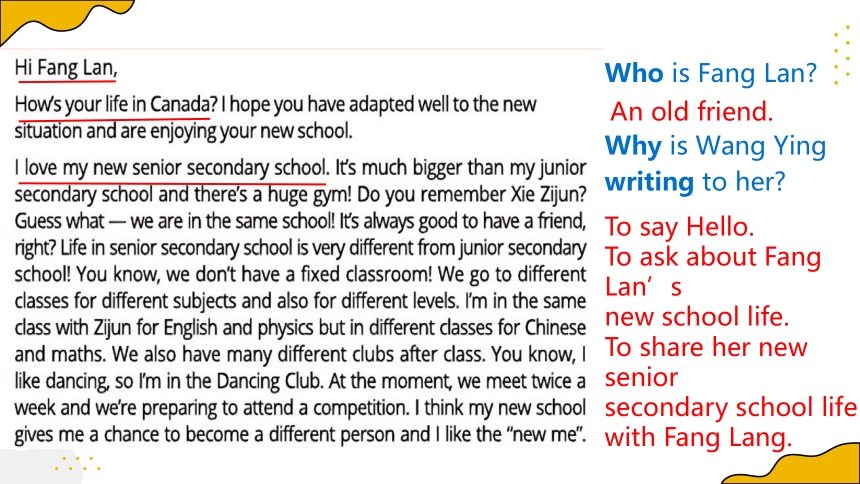

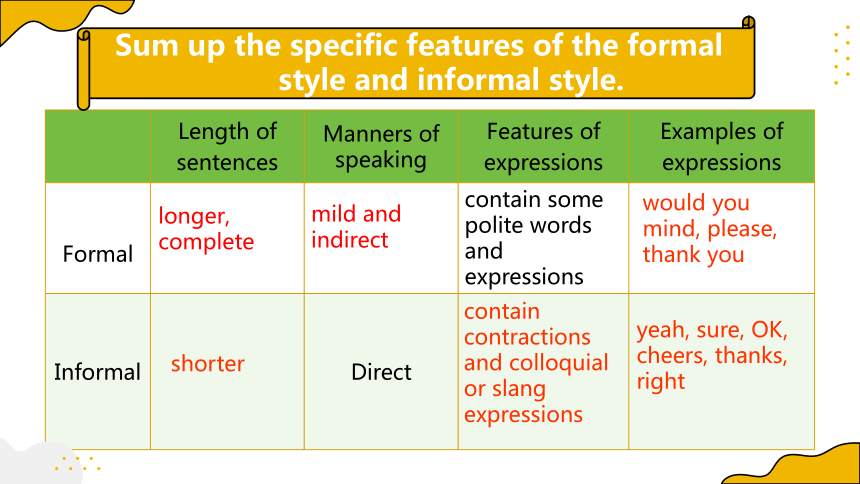
文档简介
(共32张PPT)
Unit 1 Life Choices
Writing Workshop
A Personal Email
Teaching objectives, focus and difficulties
01
Teaching Objectives
Language Competence Students can select appropriate styles based on their perception of the emotional distance from communication partners, and demonstrate corresponding stylistic features through the choice of simple and colloquial words.
Cultural Awareness Students can determine the perspectives and specific content for describing and evaluating new campus life.
Thinking Qualities Students can welcome the new campus with a positive attitude and actively seize opportunities to enrich themselves.
Learning Ability Students can use an evaluation checklist to monitor the writing process and conduct self-evaluations and peer evaluations of writing outcomes.
Key Points How to guide students to extract the structure of an email.
How to guide students to analyze the stylistic features that an email should have, and express them through the use of abbreviations and the choice of simple, colloquial words.
Difficult Points How to guide students to analyze the functions of special punctuation and apply them.
How to guide students to use the learned structure, introduction perspectives, and writing techniques to write a personal email.
Teaching Key and Difficult Points
Get ready for writing
02
Pair Work You are going to write an email to a junior secondary school classmate about your new school. Discuss your ideas with a partner.
1. Who are you going to write to
One of your good friends in junior secondary school.
2. What do you want to tell him/ her
About the school environment, the subjects you learn, the teachers, the classmates, the schedule and the school activities, etc.
3. What do you want to know from him/ her
About his / her new school just like what you’ve told him / her.
One of your good friends in junior secondary school.
About the school environment, the subjects you learn, the teachers, the classmates, the schedule and the school activities, etc.
About his / her n·new school just like what you’ve told him / her.
Read for writing
03
1. Who is Fang Lan Why is Wang Ying writing to her .
2.How does her life in senior secondary school differs from junior secondary school
3. Is the email formal or informal Why is it written this way
Read the email. Answer the questions.
Who is Fang Lan
Why is Wang Ying
writing to her
An old friend.
To say Hello.
To ask about Fang Lan’s
new school life.
To share her new senior
secondary school life
with Fang Lang.
2.How does her life in
senior secondary school
differ from junior
secondary school
It is much bigger.
They don’t have a fixed
classroom. They have
different classes and have
many different clubs after
class.
3.Is the email formal or informal Why is it written this way
Informal. It is written this way because they are friends.
Focus on Style
Length of sentences Manners of speaking Features of expressions Examples of
expressions
Formal contain some polite words and expressions
Informal Direct
longer,
complete
shorter
mild and
indirect
contain contractions and colloquial
or slang expressions
would you mind, please, thank you
yeah, sure, OK, cheers, thanks,
right
Sum up the specific features of the formal style and informal style.
Find examples of informal expressions from the email and put them in the following table .
Focus on Style
Contractions Punctuations Informal words/phrases
Examples from the sample
Other examples
How’s... I’m...
She’s... I’ve...
It’s... Don’t...
What’s...
Dashes (—)
Exclamation points (!)
Hi, Guess what,
Right You know,
Well, All the best!
That’s...
There’s...
I’d...
Let’s...
Hello, isn’t it
Sorry! Great!
Come on,
Don’t you...
Suspension points (...)
Colon (:)
Semicolon (;)
Apostrophe (’)
Focus on structure
and language
04
Label the elements (a-g) of the email above.
a. ending and wishes
b. greeting
c. subject line
d. reasons to finish writing
e. questions about the other person
f. information about one's own life
g. signature
b → c → e → f → d → a → g
b. greeting
e. questions about the other person
f. Information about one’s own life
d. reason(s) to finish writing
a. ending and wishes
g. signature
b
e
f
d
a
g
Sentence Structure (1)
We don't have a fixed classroom.
(who) (do) (what)
Subject Verb Object
We are in the same school.
(who) (be) (what)
Subject Verb Predicative
Sentence Builder
We are in the same school.
(who) (be) (what)
Subject Verb Predicative
There is a huge gym.
(who) (be) (what)
Subject Verb Predicative
My new school gives me a chance.
(who) (do) (who) (what)
Subject Verb Indirect Object Direct Object
Sentence Builder
There is a huge gym.
(who) (be) (what)
Subject Verb Predicative
My new school gives me a chance.
(who) (do) (who) (what)
Subject Verb Indirect Object Direct Object
Write 2–3 sentences about your school life that you want to tell your former classmate. Use the Sentence Builder to help you.
My new school has a huge library where I like to study. My class size is much bigger now and we move between classrooms for different subjects. I have made lots of new friends which makes me happy.
My new school has a huge library where I like to study. My class size is much bigger now and we move between classrooms for different subjects. I have made lots of new friends which makes me happy.
Subject + Verb + Object
Subject + Verb + Predicative
There + Be + Real Subject
Subject + Verb + Indirect Object + Direct Object
Find more example sentences using the following sentence structures in the email.
Find more example sentences using the following sentence structures in the email.
Subject + Verb + Object
I love my new senior secondary school.
We have many different clubs.
Subject + Verb + Predicative
Life in senior secondary school is
very different from junior secondary school!
I’m in the Dancing Club.
私人信件是指亲朋好友或同事之间的来往信件。通常包括五部分,即信头、称呼、正文、结束语和签名。
私人信件
1. 信头
寄信人地址和写信日期,写在右上角,地址由小到大。日期写在寄信人的地址之下,习惯上采用美式英语表达,即月、日、年,月、日与年之间用逗号隔开,月份尽量不缩写。
例如:
No.20 Nanjing Street
Beijing, 100000
China
June 2, 2020
2. 称呼
顶格,要大写,并且称呼后通常用逗号。
3. 正文
信件的主体部分即信的正文。正文写在称呼的下一行,每段起首处空4~6个字母的距离。正文通常包括三部分,即开头段、主体段和结尾段。正文的结尾是正文的一部分,常常另起一行。
4. 结束语
结束语与正文的结尾不一样,它要写在结尾的下一行,通常位于书信的右下角,首字母大写,后面用逗号。
5. 署名
写在结束语的下一行,除了对亲人或熟悉的朋友外,必须写全姓名。
注意:
英语书信的格式一般有两种:齐头式和缩进式。用齐头式写信,其正文与称呼之间空一至二行。每段的第一句不需要空格,但段与段之间需要空一至二行。齐头式信件的结束语和签名写在左下方。
1. Outlining
Complete the outline of your email. Use Activity 3 to help you.
Subject line: ____________________________
Greeting: ______________________________
Questions to ask: ______________________________________________________________________
Information about you: ______________________________________________________________________
Reasons to finish writing: ______________________________________________________________________
Ending: ______________________________________________________________________
Compose your writing
2. Drafting
Writing an Informal Email
It's important to:
· write informal emails only to someone you are close to, like your friends and family;
· use simple and informal expressions, like don't, well
Writing Help
Use your outline and the Writing Help to write the first draft.
Writing an Informal Email
It's important to:
· use proper email format with a subject line, a greeting, questions to ask, information to give and end with a reason appropriately;
· remember that you can use special punctuation to show your feelings.
Writing Help
3. Editing
Edit your email in pairs. Then share in class.
Is it an email to a family member or close friend
Is the email written in proper email format For example, does it have a subject line, a greeting, any questions, and also information
Does it end with a reason appropriately
Does the writer use simple and informal language
Practice
假设你是晨光中学的机器人兴趣小组组长李津,你的美国朋友Chris就读于天津某国际学校,他曾在机器人技能竞赛中获奖。你打算邀请他加入你的团队,参加即将于7月底在天津举行的世界青少年机器人技能竞赛。请根据以下提示代表兴趣小组给他写一封电子邮件。
1. 比赛的时间、地点;
2. 邀请他的原因;
3. 训练计划将发送其邮箱,请他提出意见。
注意:
1. 词数不少于80;
2. 可适当加入细节,使内容充实、行文连贯;
3. 开头和结尾已给出,不计入总词数。
参考词汇:
世界青少年机器人技能竞赛the World Adolescent Robotics Competition
Dear Chris,
I have good news to tell you. _______________________________________
____________________________________________________________________________________________________________________________________________________
I'm looking forward to your reply.
Yours,
Li Jin
One possible version
Dear Chris,
I have good news to tell you. The World Adolescent Robotics Competition will be held in Tianjin at the end of July. Hearing that you once took part in a robotics skills competition and won an award, I, on behalf of the Robotics Club, intend to invite you to join our team in the coming competition. I am sure that your involvement will not only help us win an award but also enhance the friendship between our schools.
With this e-mail I also send you our training plan, about which I wish to get your advice because you are more experienced than us. We sincerely hope that we can participate in the competition as team partners.
I'm looking forward to your reply.
Yours,
Li Jin
Summary
05
Structure: the essay includes the necessary components of an email.
Content: the topic of the essay is introducing life in a new school.
Language: an informal style is adopted in the stylistic tone.
Punctuation: exclamation marks and dashes serve to strengthen emotions and create suspense.
Homework
06
Classmates exchange works with each other, objectively evaluate others' works according to the evaluation criteria, and at the same time reflect on and improve their own works.
Unit 1 Life Choices
Writing Workshop
A Personal Email
Teaching objectives, focus and difficulties
01
Teaching Objectives
Language Competence Students can select appropriate styles based on their perception of the emotional distance from communication partners, and demonstrate corresponding stylistic features through the choice of simple and colloquial words.
Cultural Awareness Students can determine the perspectives and specific content for describing and evaluating new campus life.
Thinking Qualities Students can welcome the new campus with a positive attitude and actively seize opportunities to enrich themselves.
Learning Ability Students can use an evaluation checklist to monitor the writing process and conduct self-evaluations and peer evaluations of writing outcomes.
Key Points How to guide students to extract the structure of an email.
How to guide students to analyze the stylistic features that an email should have, and express them through the use of abbreviations and the choice of simple, colloquial words.
Difficult Points How to guide students to analyze the functions of special punctuation and apply them.
How to guide students to use the learned structure, introduction perspectives, and writing techniques to write a personal email.
Teaching Key and Difficult Points
Get ready for writing
02
Pair Work You are going to write an email to a junior secondary school classmate about your new school. Discuss your ideas with a partner.
1. Who are you going to write to
One of your good friends in junior secondary school.
2. What do you want to tell him/ her
About the school environment, the subjects you learn, the teachers, the classmates, the schedule and the school activities, etc.
3. What do you want to know from him/ her
About his / her new school just like what you’ve told him / her.
One of your good friends in junior secondary school.
About the school environment, the subjects you learn, the teachers, the classmates, the schedule and the school activities, etc.
About his / her n·new school just like what you’ve told him / her.
Read for writing
03
1. Who is Fang Lan Why is Wang Ying writing to her .
2.How does her life in senior secondary school differs from junior secondary school
3. Is the email formal or informal Why is it written this way
Read the email. Answer the questions.
Who is Fang Lan
Why is Wang Ying
writing to her
An old friend.
To say Hello.
To ask about Fang Lan’s
new school life.
To share her new senior
secondary school life
with Fang Lang.
2.How does her life in
senior secondary school
differ from junior
secondary school
It is much bigger.
They don’t have a fixed
classroom. They have
different classes and have
many different clubs after
class.
3.Is the email formal or informal Why is it written this way
Informal. It is written this way because they are friends.
Focus on Style
Length of sentences Manners of speaking Features of expressions Examples of
expressions
Formal contain some polite words and expressions
Informal Direct
longer,
complete
shorter
mild and
indirect
contain contractions and colloquial
or slang expressions
would you mind, please, thank you
yeah, sure, OK, cheers, thanks,
right
Sum up the specific features of the formal style and informal style.
Find examples of informal expressions from the email and put them in the following table .
Focus on Style
Contractions Punctuations Informal words/phrases
Examples from the sample
Other examples
How’s... I’m...
She’s... I’ve...
It’s... Don’t...
What’s...
Dashes (—)
Exclamation points (!)
Hi, Guess what,
Right You know,
Well, All the best!
That’s...
There’s...
I’d...
Let’s...
Hello, isn’t it
Sorry! Great!
Come on,
Don’t you...
Suspension points (...)
Colon (:)
Semicolon (;)
Apostrophe (’)
Focus on structure
and language
04
Label the elements (a-g) of the email above.
a. ending and wishes
b. greeting
c. subject line
d. reasons to finish writing
e. questions about the other person
f. information about one's own life
g. signature
b → c → e → f → d → a → g
b. greeting
e. questions about the other person
f. Information about one’s own life
d. reason(s) to finish writing
a. ending and wishes
g. signature
b
e
f
d
a
g
Sentence Structure (1)
We don't have a fixed classroom.
(who) (do) (what)
Subject Verb Object
We are in the same school.
(who) (be) (what)
Subject Verb Predicative
Sentence Builder
We are in the same school.
(who) (be) (what)
Subject Verb Predicative
There is a huge gym.
(who) (be) (what)
Subject Verb Predicative
My new school gives me a chance.
(who) (do) (who) (what)
Subject Verb Indirect Object Direct Object
Sentence Builder
There is a huge gym.
(who) (be) (what)
Subject Verb Predicative
My new school gives me a chance.
(who) (do) (who) (what)
Subject Verb Indirect Object Direct Object
Write 2–3 sentences about your school life that you want to tell your former classmate. Use the Sentence Builder to help you.
My new school has a huge library where I like to study. My class size is much bigger now and we move between classrooms for different subjects. I have made lots of new friends which makes me happy.
My new school has a huge library where I like to study. My class size is much bigger now and we move between classrooms for different subjects. I have made lots of new friends which makes me happy.
Subject + Verb + Object
Subject + Verb + Predicative
There + Be + Real Subject
Subject + Verb + Indirect Object + Direct Object
Find more example sentences using the following sentence structures in the email.
Find more example sentences using the following sentence structures in the email.
Subject + Verb + Object
I love my new senior secondary school.
We have many different clubs.
Subject + Verb + Predicative
Life in senior secondary school is
very different from junior secondary school!
I’m in the Dancing Club.
私人信件是指亲朋好友或同事之间的来往信件。通常包括五部分,即信头、称呼、正文、结束语和签名。
私人信件
1. 信头
寄信人地址和写信日期,写在右上角,地址由小到大。日期写在寄信人的地址之下,习惯上采用美式英语表达,即月、日、年,月、日与年之间用逗号隔开,月份尽量不缩写。
例如:
No.20 Nanjing Street
Beijing, 100000
China
June 2, 2020
2. 称呼
顶格,要大写,并且称呼后通常用逗号。
3. 正文
信件的主体部分即信的正文。正文写在称呼的下一行,每段起首处空4~6个字母的距离。正文通常包括三部分,即开头段、主体段和结尾段。正文的结尾是正文的一部分,常常另起一行。
4. 结束语
结束语与正文的结尾不一样,它要写在结尾的下一行,通常位于书信的右下角,首字母大写,后面用逗号。
5. 署名
写在结束语的下一行,除了对亲人或熟悉的朋友外,必须写全姓名。
注意:
英语书信的格式一般有两种:齐头式和缩进式。用齐头式写信,其正文与称呼之间空一至二行。每段的第一句不需要空格,但段与段之间需要空一至二行。齐头式信件的结束语和签名写在左下方。
1. Outlining
Complete the outline of your email. Use Activity 3 to help you.
Subject line: ____________________________
Greeting: ______________________________
Questions to ask: ______________________________________________________________________
Information about you: ______________________________________________________________________
Reasons to finish writing: ______________________________________________________________________
Ending: ______________________________________________________________________
Compose your writing
2. Drafting
Writing an Informal Email
It's important to:
· write informal emails only to someone you are close to, like your friends and family;
· use simple and informal expressions, like don't, well
Writing Help
Use your outline and the Writing Help to write the first draft.
Writing an Informal Email
It's important to:
· use proper email format with a subject line, a greeting, questions to ask, information to give and end with a reason appropriately;
· remember that you can use special punctuation to show your feelings.
Writing Help
3. Editing
Edit your email in pairs. Then share in class.
Is it an email to a family member or close friend
Is the email written in proper email format For example, does it have a subject line, a greeting, any questions, and also information
Does it end with a reason appropriately
Does the writer use simple and informal language
Practice
假设你是晨光中学的机器人兴趣小组组长李津,你的美国朋友Chris就读于天津某国际学校,他曾在机器人技能竞赛中获奖。你打算邀请他加入你的团队,参加即将于7月底在天津举行的世界青少年机器人技能竞赛。请根据以下提示代表兴趣小组给他写一封电子邮件。
1. 比赛的时间、地点;
2. 邀请他的原因;
3. 训练计划将发送其邮箱,请他提出意见。
注意:
1. 词数不少于80;
2. 可适当加入细节,使内容充实、行文连贯;
3. 开头和结尾已给出,不计入总词数。
参考词汇:
世界青少年机器人技能竞赛the World Adolescent Robotics Competition
Dear Chris,
I have good news to tell you. _______________________________________
____________________________________________________________________________________________________________________________________________________
I'm looking forward to your reply.
Yours,
Li Jin
One possible version
Dear Chris,
I have good news to tell you. The World Adolescent Robotics Competition will be held in Tianjin at the end of July. Hearing that you once took part in a robotics skills competition and won an award, I, on behalf of the Robotics Club, intend to invite you to join our team in the coming competition. I am sure that your involvement will not only help us win an award but also enhance the friendship between our schools.
With this e-mail I also send you our training plan, about which I wish to get your advice because you are more experienced than us. We sincerely hope that we can participate in the competition as team partners.
I'm looking forward to your reply.
Yours,
Li Jin
Summary
05
Structure: the essay includes the necessary components of an email.
Content: the topic of the essay is introducing life in a new school.
Language: an informal style is adopted in the stylistic tone.
Punctuation: exclamation marks and dashes serve to strengthen emotions and create suspense.
Homework
06
Classmates exchange works with each other, objectively evaluate others' works according to the evaluation criteria, and at the same time reflect on and improve their own works.
同课章节目录
- Unit 1 Life Choices
- Lesson 1 Lifestyles
- Lesson 2 Understanding and Coping with Stress
- Lesson 3 Your Life Is What You Make It
- Unit 2 Sports and Fitness
- Lesson 1 The Underdog
- Lesson 2 Rules of the Game
- Lesson 3 Running and Fitness
- Unit 3 Celebrations
- Lesson 1 Spring Festival
- Lesson 2 Special Occasions
- Lesson 3 Memories of Christmas
